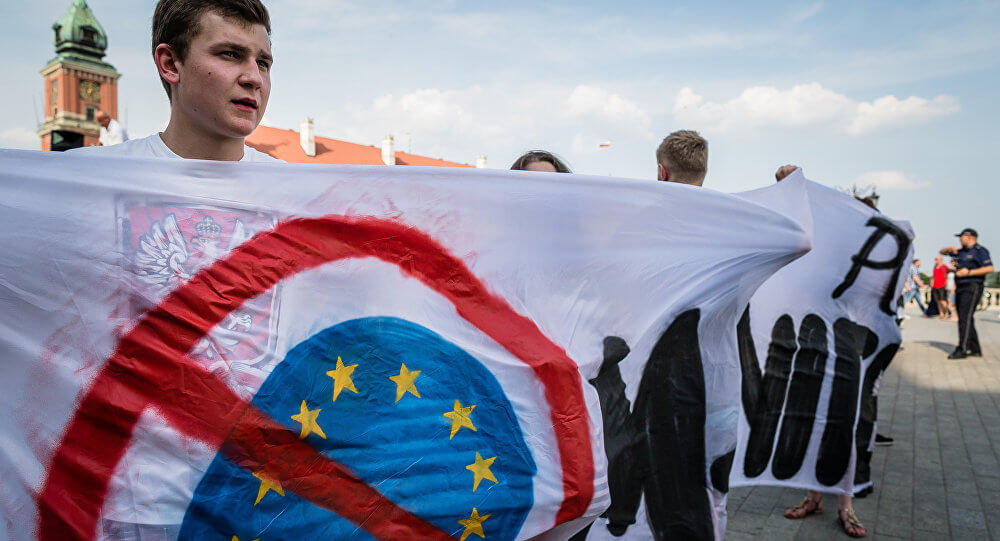Comment on the dispute between the Italian government and the European Commission on Italy’s draft budget 2019
by Klaus Draeger*
Dec.9, 2018
On macro-economics the Italian government is quite right in challenging the EU ‘consensus’ and criticizing the EU’s past and present austerity policies. On other issues (such as migration etc.) they are very much in line with the EU consensus on that – strengthening ‘fortress Europe`to the max, and aiming to go further on this, so that no migrant should be allowed to set foot on ‘Italian soil’.
If one thinks that this is ‘contradictory’ – yes it is indeed. The more so, if you look at this from a ‘left wing emancipatory’ perspective. However, in reality things might be more complicated. Tom Gill’s piece on Italy in my view is pretty good in analyzing those contradictions, and also in criticizing the neo-liberal elements of the M5S-Lega coalition’s ‘peoples budget’: e.g. the flat tax rate of 15 % for small businesses, an amnesty for tax-dodgers, or the ‘citizen’s wage’ scheme which at a closer look is ‘workfare-light’, comparable to the infamous Hartz IV scheme in Germany.
Equally, we could look at Hungary and Poland: the governments of these countries (hard right, ‘illiberal’ etc.) definitely launched some attacks on the ‘neoliberal agenda’. For example, the PiS in Poland by introducing some kind of ‘social minima’ for the poor (aimed at their voter base in the countryside). And also by demanding a tax on western European supermarkets, which the ECJ rejected. In Hungary, Orbàn ‘reformed’ the pension system – integrating the ‘capital based’ pillars of it (introduced by the neo-liberal Hungarian “Socialists” in the 1990s) into the statutory system. Apart from that, Orbán is of course building up a strict ‘workfare state’ regime for the unemployed and the excluded.
Social reforms involving at least some social minima (which in those countries did not exist before), and pension schemes of the kind mentioned here have proved quite popular among underprivileged sections of society in the respective countries insofar as they seem to provide them with a much-needed safety net – not to be laughed at since this is the very thing which the neo-liberal right and centre-left always denied them. In that respect, the European hard right is much smarter than the centre-left and even the radical left in regard to the means by which they have sought to win hegemony for their reactionary and authoritarian rule.
Which leads us also to the issue of ‘social inclusion’ (and how to generate it). To see how this works in principle we might go back to Fascist Italy and Nazi Germany, or even further back to the “Bonapartism” of Napoleon III where, in my view, the earliest parallels with versions of the macro-economic and social policy in countries governed by “hard right” today could be seen at work. Only to mention Napoleon III: he deplored the massacres against the workers of the Paris Commune, created green parks which workers and their families should enjoy etc. – just to push back the specter of French Socialism growing in strength and to underpin his otherwise militarist and authoritarian rule.
For hard-right parties and their supporters, it’s pretty clear: only the hard-working masses – possibly including migrants already settled in Europe before the present “crisis” and “deserving” members of the gay community, as the deceived hard-right leader Pim Fortuyn put it in the Netherlands – will be entitled to protection by the national welfare state, while “new arrivals” [current refugees and migrants] are to be denied a welcome.
To draw on Bertolt Brecht’s distinction: The left opposition traditionally tried to follow the logic of ‘Keiner oder alle – alles oder nichts’ (all or nobody – all or nothing), seeking to push for an egalitarian and emancipatory, socially inclusive solution. The right-wing ‘populist’ opposition follows the logic of ‘Für alle reicht es nicht’ (there is not enough for everybody).
The problem for the lefties in my view is this: how to define this socially inclusive solution at the ‘national level’ (and downwards to the regional or local levels’) to become stronger? One can have a lot of proposals also for the European and global level. But these are mostly interesting for ‘experts’, intellectuals and the like (‘model building’ exercises – nothing against that – but often too complicated for ‘ordinary people’ to rally around such quite complex conceptions).
In particular, good intentioned proposals of some forces on the left to transfer competencies on social policy to the EU level (e.g. by creating an EU-scheme for unemployment insurance etc.), will only backfire . The EU’s record on this are the dictates of the Troika (against Greece, Spain, Portugal, Cyprus, Ireland etc.) in the past, the EuroPlusPact (2011), the Fiscal Compact (2012) and ‘EU-Economic Governance’ (2012) with the European Semester Process – all that strongly biased to slash trade union rights, attack pensions and social welfare, collective bargaining and the like. With the current relationship of forces (authoritarian EU, neo-liberalist consensus between the centre-right and the hard right – see e.g. Austria), in my view it is illusionary to expect genuine social improvements from transferring social policy competencies to the EU level.
* Klaus Draeger worked for the group of the European United Left/ Nordic GreenLeft as staff co-ordinator in the European Parliament’s Committee on Employment and Social Affairs; now retired. He is a member of the advisory board of the German magazine ‘Z’ (Zeitschrift Marxistische Erneuerung ZME; Journal Marxist Renewal).
Also read
Hungary approves ‘slave labour law’ stripping workers of rights
Israel rolls out the welcome mat for Europe’s neo-fascists











